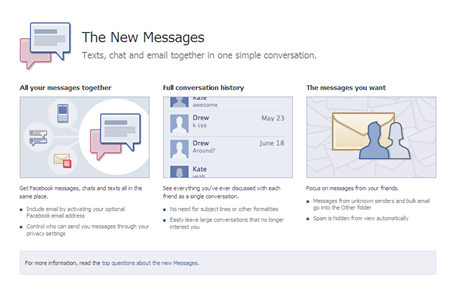eDiscovery Daily Blog
eDiscovery Trends: Facemail and eDiscovery

Email is dead.
So says Facebook founder Mark Zuckerberg. “It’s too formal,” he declared, announcing his company’s new messaging service last week in San Francisco.
Facebook announced last week that it’s rolling out a new messaging system, including chat, text messaging, status updates and email (surprise!). Zuckerberg touts it as a way of bringing messaging systems together in one place, so you don’t have to remember how each of your friends prefers to be contacted. Will the integrated product (informally dubbed “Facemail”) that some have called “Gmail killer” be a serious threat to Gmail, MSN and Yahoo Mail? Maybe. With 500 million plus users, Facebook certainly has a head start towards a potentially large user base.
However, some caveats to consider from a business standpoint:
- Facemail messages will be clustered by sender instead of by subject, which they consider to be “antiquated”. May be great from a social standpoint, but not so good when you need to follow the thread of a conversation with multiple people.
- Unified messaging is not an entirely new concept. Just last year, Google introduced Google Wave, designed to “merge key features of media like e-mail, instant messaging, wikis, and social networking”. Earlier this year, Google announced plans to scrap Google Wave after it failed to gain a significant following. It will be interesting to see whether Facebook can succeed where Google failed.
- From an eDiscovery perspective, the potential concern is that Facebook plans to preserve these messages, regardless of the form in which they are generated, forever. So, if your company has a retention policy in place, these communications will fall outside of that policy.
Is it time to panic? It might be tempting to overreact and ban the use of Facemail and other outside email and social media sites, but that seems impractical in today’s social media climate.
A better approach is to have a policy in place to govern use of outside email, chat and social media that covers what employees should do (e.g., act responsibly and ethically when participating in online communities), what employees should not do (e.g., disclose confidential information, plagiarize copyrighted information, etc.) and the consequences for violating the policy (e.g., lost customers, firings, lawsuits, etc.). We will talk more about a social governance policy in an upcoming post. In the meantime, here is a reference to our September post for information on requesting information from Facebook via civil subpoena.
So, what do you think? Does your company have a social governance policy? Please share any comments you might have or if you’d like to know more about a particular topic.
P.S. – So, what happened to the architect behind Google Wave, Lars Rasmussen? He just joined Facebook. Interesting, huh? 🙂
